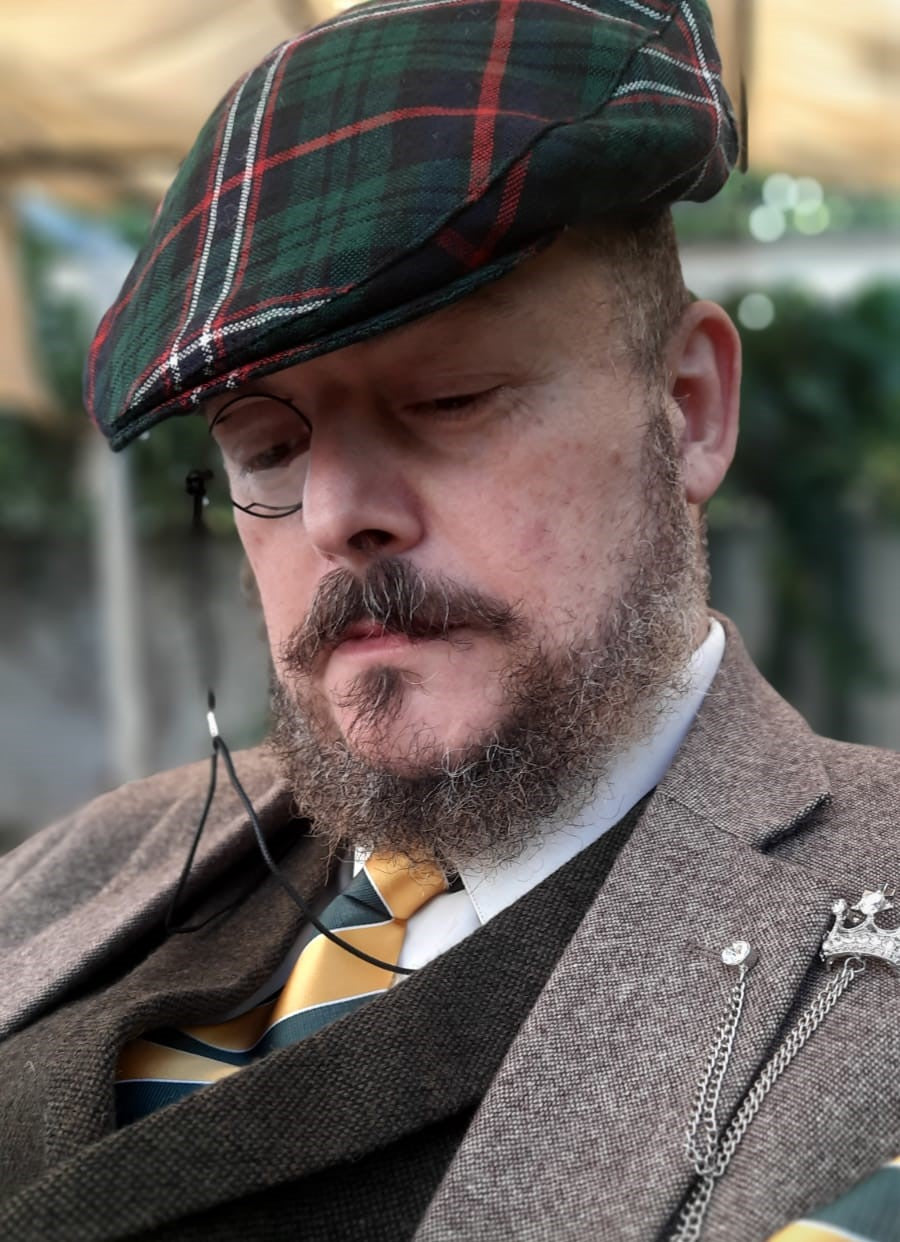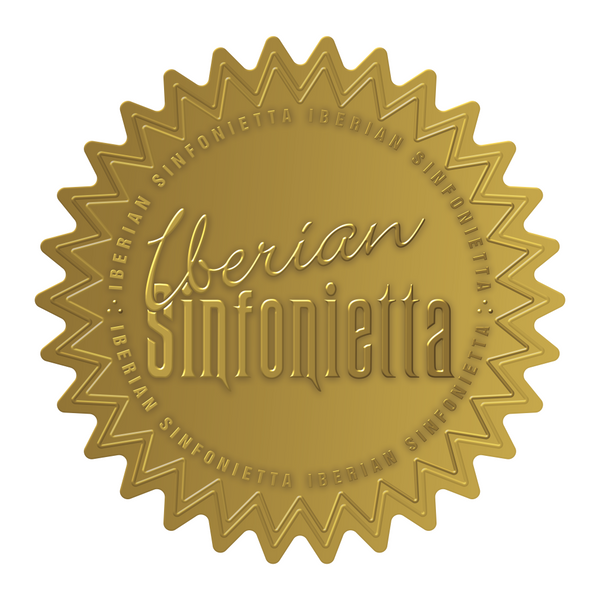
AN APPOINTMENT WITH... FRANCISCO JOSÉ MARTÍN JAIME AND THE RELEASE OF SHADOW OP. 16
Dear audience:
Next Saturday, September 16 , as you know, we begin this new journey in the 2023/2024 season. Within this first concert, and as one of its important incentives, is something that is becoming “usual”, an Absolute Premiere. This does not diminish his interest, quite the opposite, it speaks of a commitment to music, his world, and specifically with one of the most complex aspects, creation. In this sense, the season will begin with a concert whose first work is, defining it now more appropriately, an absolute revival in Spain. Exciting. We took the opportunity to talk with the composer, Francisco José Martín Jaime (1970 - ) and his work Shadow, Op. 16 .

Shadow Op.16. What is it about?
Shadow is a symphonic poem for chamber orchestra or reduced symphony orchestra, which I composed in 1992 for the Twents Kamer Orkest (today Oost Nederlands Orkest) of Esnchede, Netherlands, commissioned by its conductor, Lex Oosthoek. It is based on a story by Edgar Allan Poe and marked the beginning of the compositional approach that has become my modus operandi for the rest of my life, the Music of Thelema or Music of the Will. Shadow begins at a funeral banquet (typically, outside of space-time, that is, indeterminate time and place, although Poe points to Classical Greece). The shadows become increasingly denser until they materialize in a paroxysm of darkness to which the narrator of the story - in first person - asks who it is. The shadow answers I'm Shadow, (“I am Shadow”), and his voice resonated with the voices of hundreds of disappeared friends. In this terrifying and enigmatic way, Poe ends his story.
How did this work come about?
I have already mentioned that Maestro Oosthoek commissioned me to complete a program at the premiere with Mozart's Concerto for Clarinet and Orchestra and Beethoven's Fourth Symphony. The instrumentation had to be appropriate for that concert, since the orchestra was going to have only that template. It wouldn't have hurt me to have timpani, trumpets and trombones but, to tell the truth, the limitation of the template for the ambitiousness of the work was an incentive rather than a hindrance. Being at my first symphonic premiere, in a foreign country and surrounded by Mozart and Beethoven, was a tremendous commitment that I faced without fear thanks to the unconscious courage, the result of the inexperience granted by the 21 years I was then.
The last important work that I had completed was my Second Symphony, my Gothic Symphony, composed then in praise and memory of someone who has been the love of my entire life, and who today, happily, is my partner. A monumental work, very central European, for large orchestra, destined to be kept in the drawer for many years, since it started from my need to compose and not from any commission. In that symphony I was looking for my own path, both compositionally and personally (I composed it between the ages of 17 and 18, until I was 20 I copied it by hand), which I ended up finding in the metaphysical writings of Aleistair Crowley and his Thelema. Thelema means Will in Greek, and I was especially interested in this concept: that each note of my Work was the result of my Will, and not of any chance. If we take into account that what we call chance is, in divine terms, causality, we will understand what, many years later, in a scientific-philosophical article, I stated that to compose is to play at being God.
In Shadow I used Wagner's Leitmotiv technique for the first time, although in a very expanded way, allowing the musical evolution of the motifs and their fusion with each other. Casting always has to be done with heat and blows, so a lot of energy is provided and generated, which is what I needed in my music, especially given the plot of Poe's text.
Thus, even though it is a work from a fairly young age (I finished my First Symphony when I was 16, a symphony of almost an hour for choir and large orchestra in five movements, which was not my first work either, so I can conclude that my youth was really early), Shadow is a very well consolidated work, strongly based, coherent and energetic (all that was said by the Dutch and German critics on the different occasions in which it has been programmed in Northern Europe). They also said that it opened paths to the future of Music from tradition and without going against the public. Although history will tell that.
Opens the Iberian Sinfonietta season. Sensations...
Many and very good. It is magnificent that an orchestra with the trajectory and with the projection of Iberian Sinfonietta is the one who premieres this work in Spain. I do not deny that I find it regrettable that no one has taken the initiative to do it before, but I also do not deny that I am immensely happy that it is this orchestra and its director, maestro Juan Paulo Gómez , who are premiering it in my country. No one in the audience can even imagine the blood exuded in the trance of the composition by the composer (sometimes it takes years to compose the largest works, we must not forget that, for example, Richard Wagner dedicated twenty years of his life in compose the Tetralogy), nor the hopes and frustrations that are suffered later, searching for a space in the reality of the world to integrate one's own work, which, in Music, is especially difficult. The rules of the composition game are strange. I also feel very grateful for the place of honor they have given me. Opening a regular season of concerts is a very privileged position that Iberian Sinfonietta and maestro Juan Paulo Gómez have granted me, and that demonstrate better than in any other possible way their love for me and my music. I have humbly tried to reciprocate by making a reissue of the score especially for them. The latter is a small token of love, but doing it means a lot to me.
At what moment did this work reach you?
Honestly, in an ecstatic moment. About two years ago I decided to focus my personal and professional efforts on composition, leaving aside my career as an orchestra conductor. I don't have the strength or time to carry out both. Since then, wonderful things have happened in my life. It seems as if the Fates were waiting for me to make that decision to favor me. Fortune is always favorable to me. The fact is that, in January of last year, I was commissioned to compose an opera, Eva, Op.91 , which I am finishing, composed for Carlos Álvarez and Berna Perles. Although the premiere will probably have to be very far from here, things of destiny. In summer, maestro Rahbari, who since his time at the Malaga Philharmonic Orchestra has become one of the most relevant orchestra conductors in the world, called me to commission a symphonic work based on Flamenco. After composing it and successive miracles occurring, it premiered on July 14 at the Mariinsky Theater in Saint Petersburg, Russia. The miracles, I'm sure the expression intrigues, have been, among others, that the Mariinsky Theater's programming is closed for about four years, however there was a gap for this July, which Maestro Rahbari was asked to direct, and that they gave him the opportunity to choose the program. In the teacher's own words, those things don't happen. However, they happened, and I have had the honor of being the first Spanish composer (and, therefore, Andalusian and Malaga), to premiere a composition at the Mariinsky Theater, the “home” of Rimsky Korsakov, Rachmaninov or Shostakovich, and also of being the first Spanish composer whose work was performed in said theater while he was alive (I must admit that I took special care of myself the days before, lest I not be able to achieve it). And in the middle of war.
Now I am still immersed in the composition of “Eva”, I have yet to finish another opera, “Medea”, and several other projects, among others a third opera, for which I am already working on the libretto, in addition to various premieres (Barcelona, Switzerland, ...), and a tour with my “Flamenco Suite” (the one premiered in Saint Petersburg and after its recording), through the East, especially China.
A fulfilling moment in my life, without a doubt. Here you would have to imagine an emoticon, that of the little face with several hearts around it.

Any advice for listening to its re-release on Saturday.
I recommend, as far as possible, having previously read Allan Poe's text. It is obviously not a transliteration, nor a description. This music must be understood, just as in opera, as everything that words cannot express. The saying goes that a picture is worth a thousand words, but music can express more than a thousand words and a thousand images.
Once you have read the text and, taking into account the above, I would recommend closing your eyes so as not to let your eyes distract your soul, and abandon yourself to listening, blocking all thoughts to be able to apprehend all the sensations and let the feelings emerge. It is not a work of love, but there is a lot of terror, a lot of vertigo before the Abyss, a lot of nostalgia for what was and panic before what Is. But it is enjoyable.
Something that remains in our minds.
Well, I wanted to leave one thing for last. Although I have already thanked Iberian Sinfonietta and its director, maestro Juan Paulo Gómez , for including me in the programming and, furthermore, in such a distinguished place, I want to reiterate it, and even so I do not think I am able to clearly and reliably show the gratitude that I professed. And, also, to the Association of Composers and Performers of Malaga (ACIM) and its president, Alejandro Cano, for the initiative and tenacity in creating opportunities for musicians from Malaga, we should remember that the only initiative for the creation and dissemination of music of the living Malaga composers is the one that ACIM has, once the public institutions that supported and maintained different commitments to it have been falling away and leaving those creators helpless with whom, in the future, those same institutions will be filled mouth in praise when we are dead. And, for that same reason, to the Fuengirola City Council , for promoting and supporting this orchestra and hosting with so much care and affection this inaugural concert of the Iberian Sinfonietta Season, in which I have the honor and privilege of “uncorking the champagne.” .
We say goodbye to the composer, wishing them luck on the day of the premiere of their work before the public in Spain. Not to miss it.
Jorge Rodríguez Morata
Pedagogical content coordinator.
